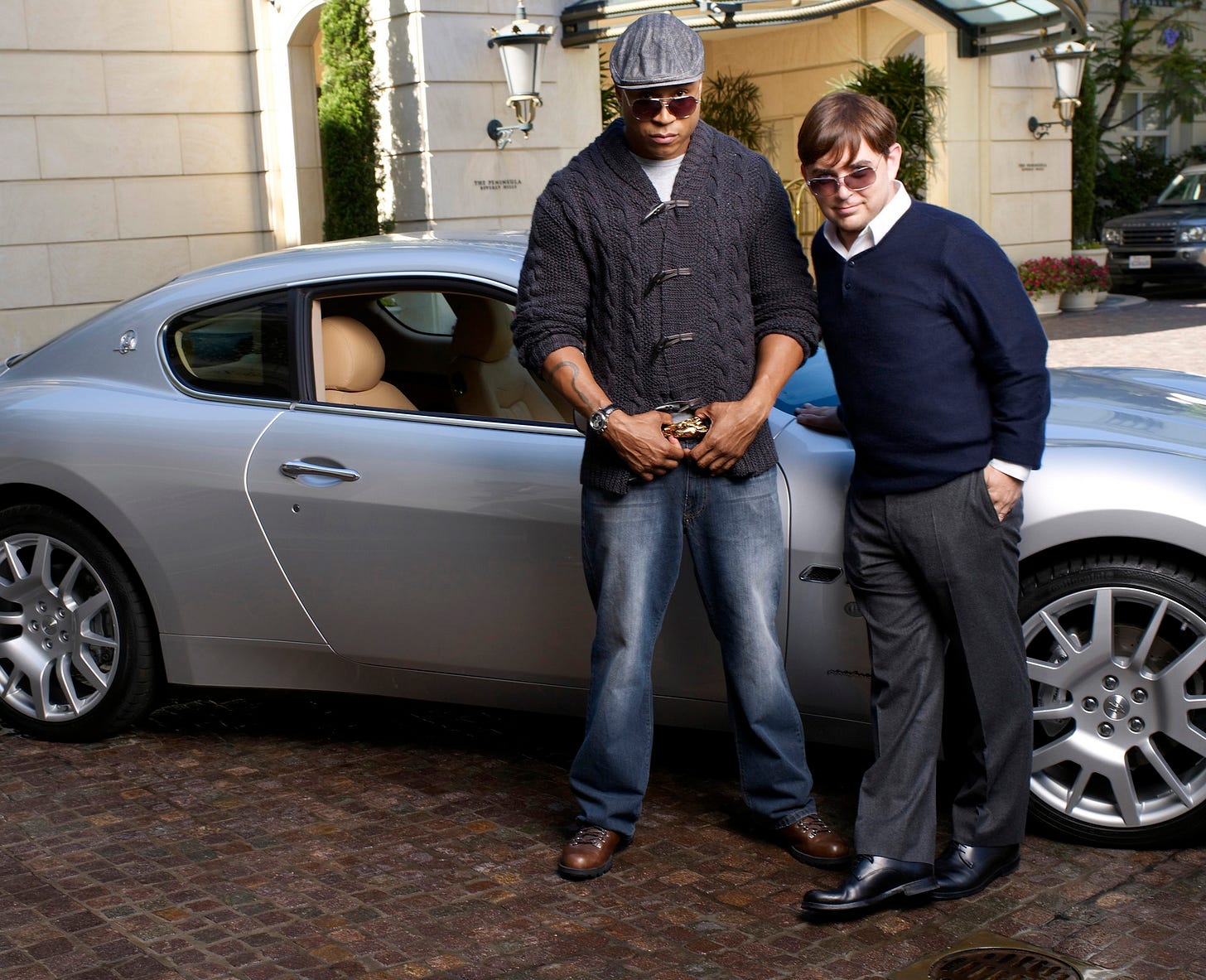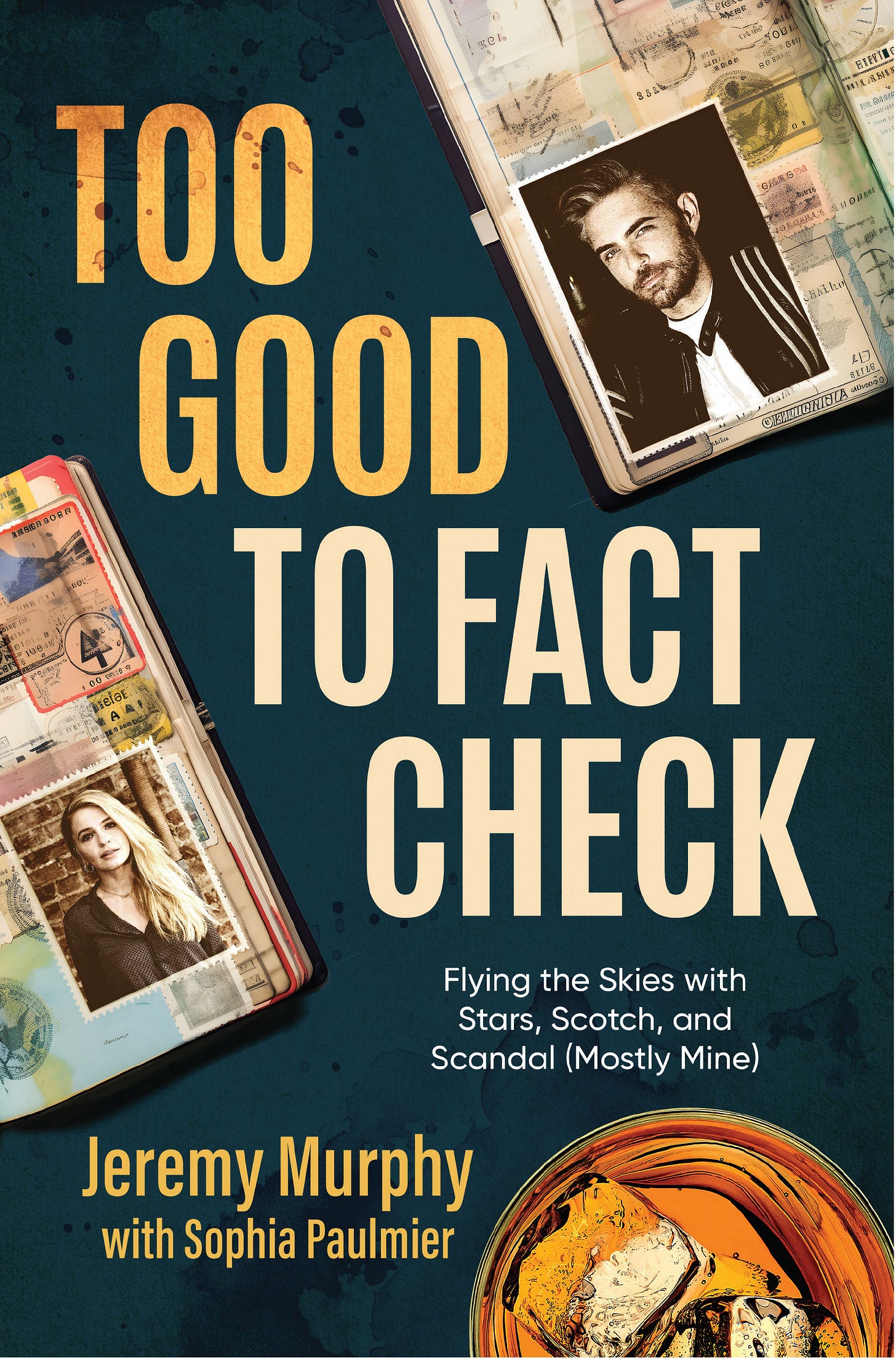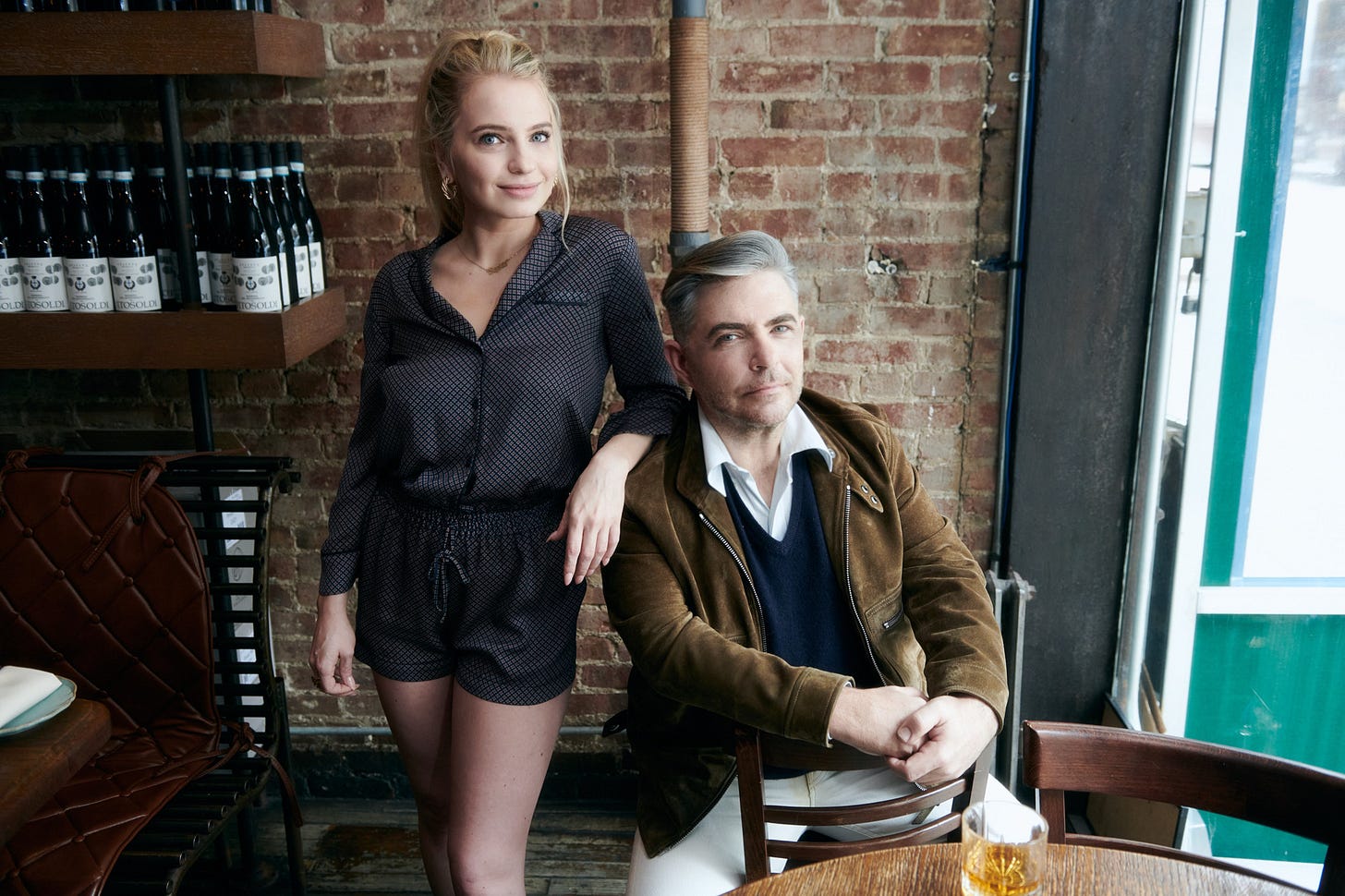Q&A: Ten for The TEN with Jeremy Murphy
Media trailblazer and author of an entertaining new celebrity journalism memoir
We’re moving into memoir territory this week with magazine editor turned author, Jeremy Murphy.
He’s just published his wildly entertaining - and searingly frank - second book, Too Good To Fact Check, Flying the Skies with Stars, Scotch and Scandal (Mostly Mine), in which he chronicles his travels with celebrities and the outrageous antics that ensued.
As the editor of CNN’s Watch magazine, he spent more than ten years overseeing photoshoots with LL Cool J, Neil Patrick Harris, Mayim Bialik, Julianna Margulies, Simon Baker, Harrison Ford, Christine Baranski and many more. A global enterprise, New York, Paris, London, Milan, and Shanghai, are wonderful supporting characters.
Having spent a good few years myself working in the world of celebrity journalism, I laughed out loud at some of the ridiculous situations Jeremy found himself in, including last minute fashion panics, logistical headaches and the hoops he jumped through to land the talent.
Watch was a glossy monthly created by Jeremy at CBS, where he was a Vice President working across many communications roles. The mission of the magazine was to showcase a celebrity's perspective on art, beauty, and glamour - and it did that in spades.
Many of his concepts became front page news including a gorgeous shoot with Kaley Cuoco, from The Big Bang Theory, which was photographed by Patrick Demarchelier, who also shot The Good Wife actress, Julianna Margulies, at the Hotel du Cap, in the Côte d’Azur.
Sadly, post-Covid the magazine folded but at its height it had a circulation of around 200,000 copies per issue, which is insanely fabulous. There was much more to come though for Jeremy, who left the magazine to start his own hugely successful New York-based PR company 360bespoke.
The book is full of heart and refreshingly honest, and that carried through to our interview where Jeremy was equally candid about working with the rich and famous, saying: “After a decade dealing with coddled, entitled starlets, I’d rather stick a fork in my eye than do that again. I did get lucky with a lot of the actors from CBS who were just awesome - NPH, the cast of The Good Wife, NCIS, Big Bang Theory - but the dance of working with personal publicists, managers, stylists, make and hair artists? Fuck no. I do love pop culture and fashion but as an observer. I appreciate it more that way because once you learn how the hotdog is made you don’t want to eat it again.”
He co-authored Too Good To Fact Check with Sophia Paulmier, a New York based writer and award-winning filmmaker, and below he explains why he asked Sophia to join him on this outrageous journey down memory lane.
Jeremy is also the author of F*ck Off, Chloe: Surviving the OMGs! and FMLs! in Your Media Career, a best-seller about the culture clash between young and old in the workplace. He’s also the screen writer of House of Medici, a TV series produced by James Brolin and Scott Hart, that is currently in development.
With so much ground to cover including the delicate world of celebrity in the age of social media, Jeremy’s writing process, his experiences in the publishing industry and his own personal background, which is as far from the world of celebrity as you can imagine, I’ve thrown the ten-question format out of the window and allowed Jeremy to wax lyrical.
This is a sensational peek behind the celebrity curtain and there are many colourful anecdotes to revel in. So grab a coffee and enjoy this wonderful romp through Jeremy’s entertaining life in media.
“I write when I’m inspired, and that does not go by clock. Sometimes I’m swimming with ideas and sometimes I’m dragging ass.”
Hello Jeremy! Thank you for taking time to talk to The TEN. Can you outline your early career and tells us a little about how you got to where you are today?
I started as a copy editor at a small newspaper called The Boca News, in Boca Raton. I graduated to feature writer, then moved to another newspaper, The Bradenton Herald, on the west coast of Florida.
From there I went to Mediaweek, in New York, to cover local media - TV, radio, newspapers, etc. CBS hired me after a year and a half to work in their corporate communications office doing PR and writing/ editing press materials.
I got bored and envisioned a magazine about all the stars on CBS, which I pitched up the chain. To my shock, it was approved and I spent the next 10 years running Watch magazine, while continuing my role as a VP in the communications department.
After a decade, I left to do my own thing. I started a company, 360bespoke; began writing speeches for people like shoe designer Steve Madden; Elle magazine editor in chief Nina Garcia, even Dolly Parton. In 2021, I got an offer to write my first book, F*ck Off, Chloe, and two years later my second, Too Good to Fact Check.
You've been interviewing, and working with, famous people for a long time. Why did you decide to write Too Good To Fact Check now, and also why did you decide to bring in your co-writer Sophia Paulmier?
After my first book people assumed I was now an author and kept asking what’s next. I didn’t know. Then a colleague suggested I write about my experience with the magazine, from creating it to seeing it through its first decade. Post Hill Press, a respected small publisher, liked the idea and signed me to a deal.
At first, it was a collection of anecdotes about my interactions with celebrities but it began to read hollow. There was no heart. Sophia is a young writer with an incredible voice and wit. I knew I needed someone to get memories flooding but maybe challenge/ question me about what I’d remembered. She found the thread, which was my experience over the decade, and how it affected me and shaped who I am now. That gave it the heart that was missing.
Sophia holds a mini question-and-answer session at the end of every chapter. Can you explain why you wanted to go with that format?
It was a bit counter intuitive, I know, but she had such probing, unexpected, fun and random questions that I found disarming. Illuminating, even. I wanted to get her voice in the book, not just mine, and her ‘interrogations’ really held my feet to the fire. I thought they added a surprising element to the narrative.
Why did you choose to open Too Good To Fact Check with an anecdote about Harrison Ford – or as you call him ‘Harrison Bored’ - promoting a terrible movie?
Harrison was the biggest star I worked with, and the experience was so absurd I knew it would grab the reader. He was starring in a movie about dying children that was unintentionally hilarious. I could - and have - dined out on that story for years.
From conceiving the idea to writing the words ‘The End’, how long did it take you to write the book?
About a year. Maybe a few months more. There were multiple versions. Lots of new stuff added, other deleted. It was excruciating but cathartic. I’m very proud of the finished product.
As you should be! How did you go about doing your research to ensure that it was factually correct?
Lots of research. First, Sophia and I would meet twice a week and go through back issues over a bottle(s) of wine. She read everything in advance and came with questions. That triggered a lot of memories, and fortunately a lot of it was in print.
I also talked to a lot of colleagues to make sure my recollections were accurate. I was admittedly drunk during several incidents so I got witnesses!
The nature of celebrity has changed over the years. I'm sure it used to be more fun but maybe that's just because I'm older now! What exactly do you think an interviewer can expect to get out of a famous face today, bearing in mind they are so micro-managed?
It’s totally changed. They’re all in a bubble, surrounded by sycophants who need to justify their jobs by being mean and demanding. Personal publicists were the bane of my existence. There are several who are awesome, but they’re an endangered species.
Celebrities tell you nothing, and if they do, the publicist threatens you into not using it. That’s taken all the fun out of the process. I’m going to be 50 next year and still have PTSD from some of my experiences. I think writing the book re-opened a lot of wounds that never healed.
Do you think there are any real movie stars left? For me, social media has changed the playing field – try as might, I can’t see Elizabeth Taylor filming a TikTok in her sweats.
That’s a very good question. I think the stars are the ones who lower their guard and let you see who they really are. There aren’t that many left. Pink is someone who speaks her mind. There’s nothing you can’t ask. Neil Patrick Harris is a terrific interview, as is [NCIS actor] Michael Weatherly.
But the mould was and still is what [publicist] Pat Kingsley did with Tom Cruise: she helped make him a star by answering nothing, and bullying those who asked revealing questions. That is the modern day blueprint. And now you have a generation of young publicists who learned the trade from the worst people imaginable.
“I’m going to be 50 next year and still have PTSD from some of my experiences. I think writing the book re-opened a lot of wounds that never healed.”
The questions I’m always asked about my career interviewing the great and the good is ‘Who was the best and who was the worst?’. You can interpret that in whatever way you wish but who was your best and worst?
I got lucky with some really great interviews: Julianna Margulies, Neil Patrick Harris, Christine Baranski, even Celine Dion. I had good writers who knew how to get good quotes and anecdotes out of them. And we took stars to exotic locations like Paris, London, Milan, Florence, even once Bora Bora. Being with them in some far off destination lowers their guard and you get to know them personally.
The worst? Harrison Ford was a grump. Lucy Liu was a pill - I wrote her hostile gaze could end global warming. LL Cool J was a handful - nice, but a lot to deal with. David Caruso was nutty. We got really good at learning who the landmines were before offering them covers or trips. Life is too short, you don’t want to be stranded with assholes.
Your first book, F*ck Off, Chloe, about industry veterans working with the younger generation, was equally hilarious. Why did you decide to write it?
I was drunk! It was during the pandemic and I was writing snotty lists of everything I hate about PR on a Facebook group called PR Czars. Someone from Skyhorse Publishing read what I’d posted and contacted me about expanding it into a book. I know every aspiring writer will hate me for saying this but both books were kind of accidents; I didn’t intend to write either.
How did you land an agent (if you have one), and how important is that relationship to you?
I had an agent that didn’t work out, for many reasons. I’m still a new voice and not yet marketable. Both books got great PR because I was pressing it hard, but that doesn’t always make you a sell-able commodity.
I decided to work with a very close friend, Faith Zuckerman, who worked at big agencies and has a lot of great relationships. She and I are producing several scripts I’ve written, and she seemed like a natural choice to entrust with my writing career. It’s important you know who is representing you, and believes in you.
What is your typical writing routine, and what aspect of the writing process do you enjoy the most?
There is nothing typical about my life; I’m a hot mess from morning to night. I write when I’m inspired, and that does not go by clock. Sometimes I’m swimming with ideas and sometimes I’m dragging ass. I do tend to get ideas during the day and put them in writing at night with liquid courage (hello, Macallan). I think that’s evident in much of what I’ve written.
What’s next for you in terms of writing?
Faith and I have several projects in the works - a screen adaption for F*ck Off, Chloe; developing House of Medici, which is being co-produced by actor James Brolin and Scott Hart; and working on several other scripts I’ve written, including Python, about the dangers of AI, and Court of St. James, which I describe as ‘Gossip Girl in The West Wing’.
And finally, what do you think is the secret to writing a compelling memoir because TGTFC verily romps along - and also, you don't shy away from being self-deprecating?
Thank you for saying that! It was my first (and hopefully last!) memoir so I’m humble enough to say I don’t know the secret. I just wrote what I wrote.
What was important to me was capturing my true self. I was very insecure, lacked confidence, aimed to please people too much because I didn’t trust my own judgement, when I should have. I was an overweight kid from the suburbs who didn’t look like I should be working in Hollywood. And I wanted to impart that to the reader because it explains who I am and what I did.
Too Good To Fact Check, Flying the Skies with Stars, Scotch and Scandal (Mostly Mine), is published by Post Hill Press, and is out now.
Follow Jeremy on Instagram.






